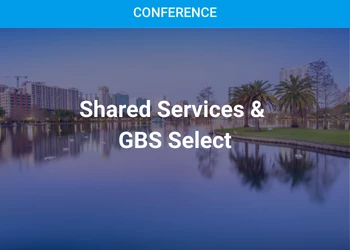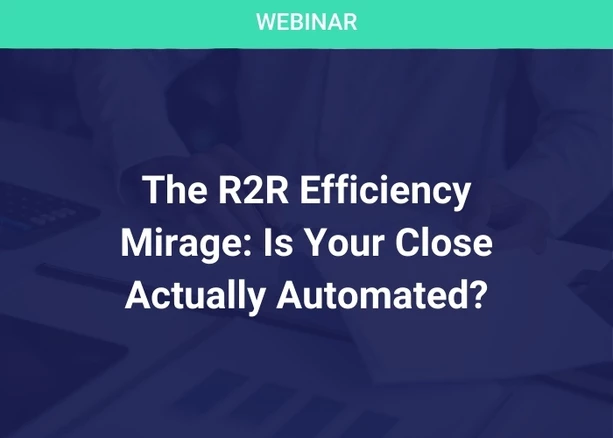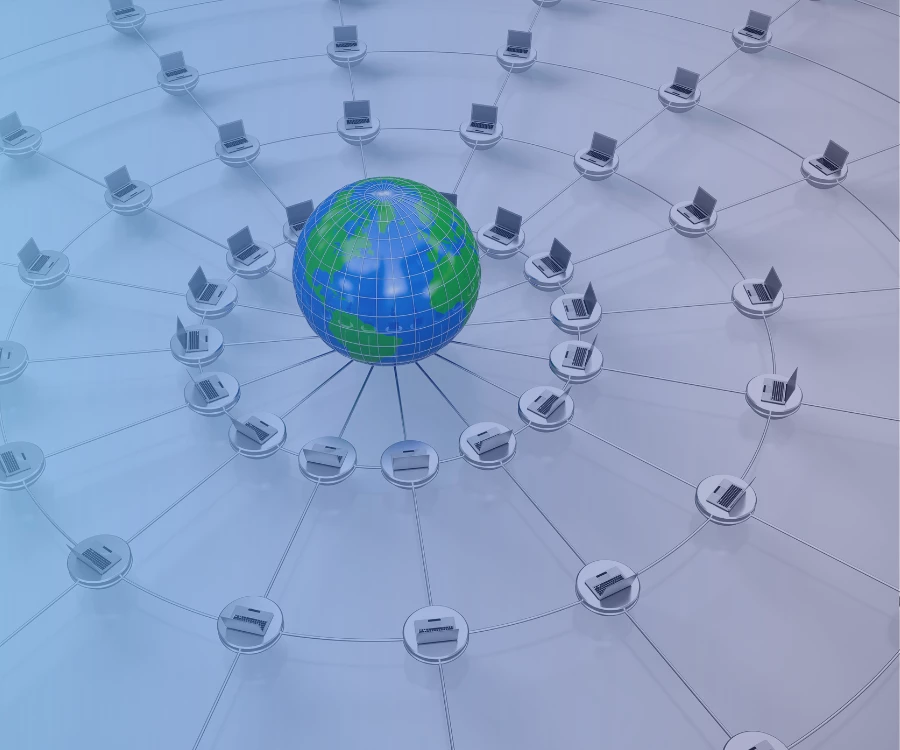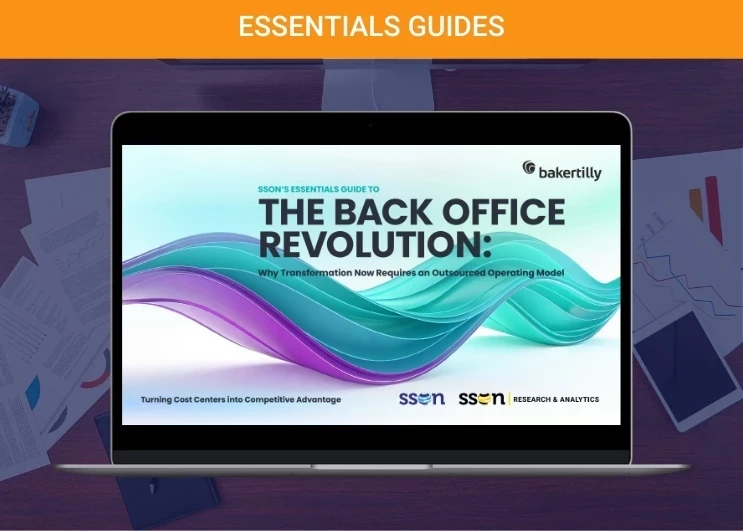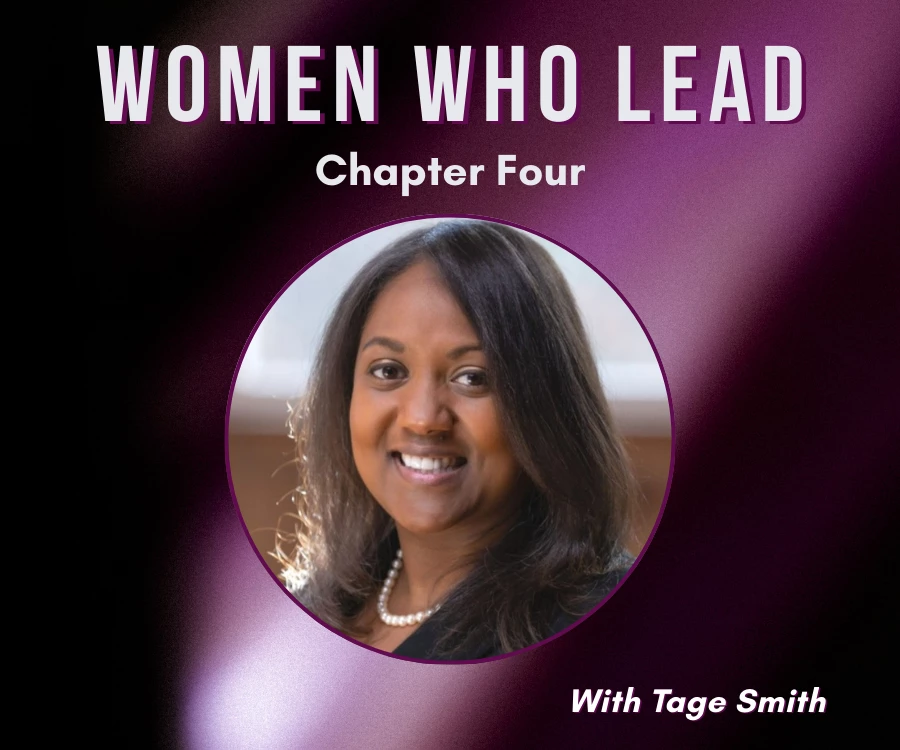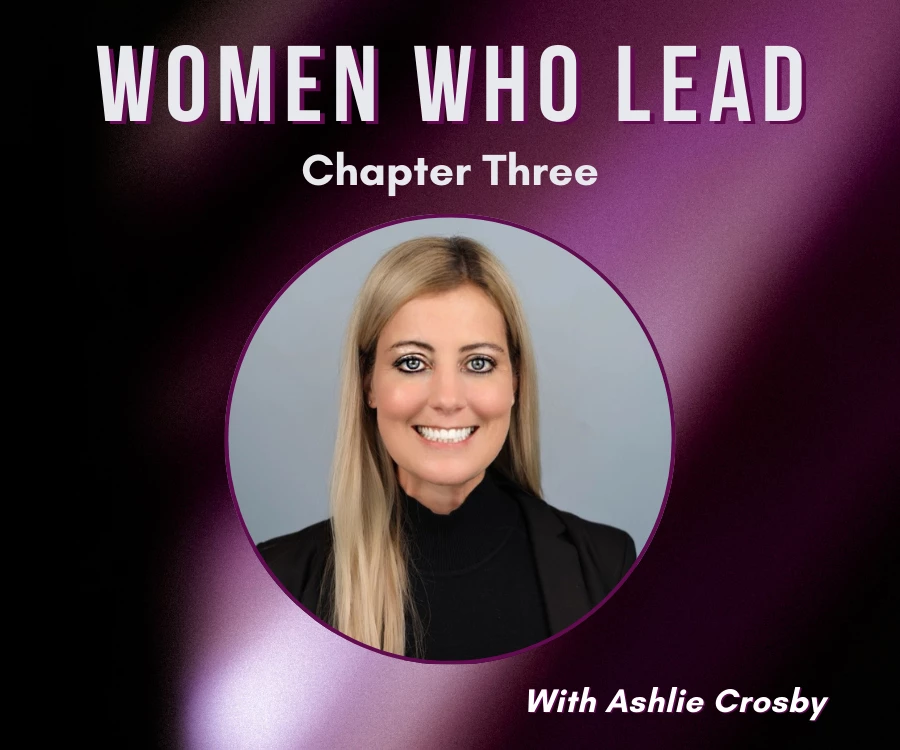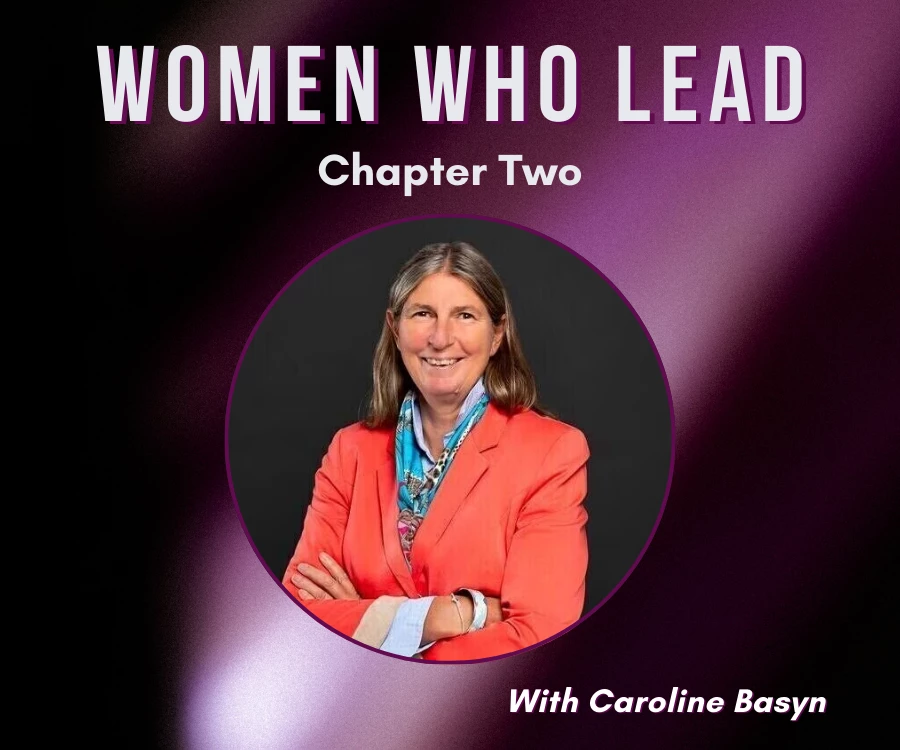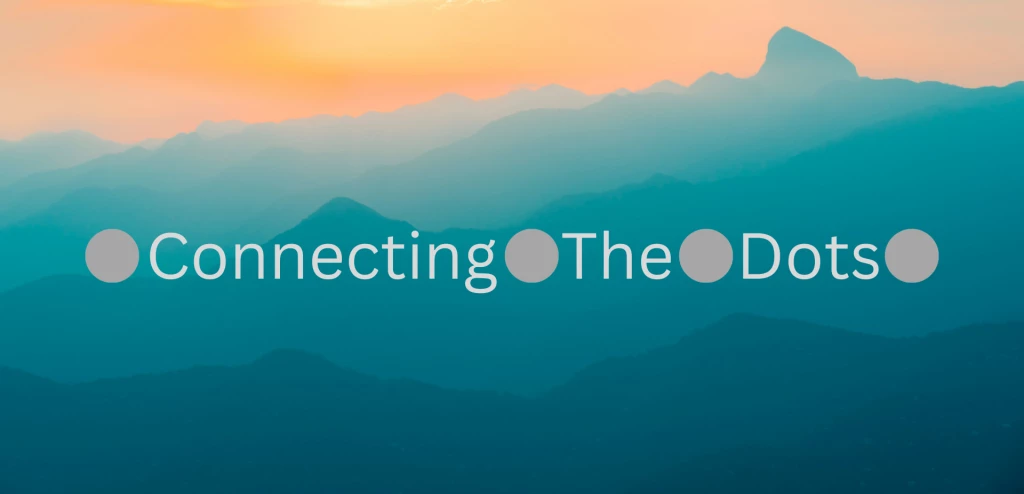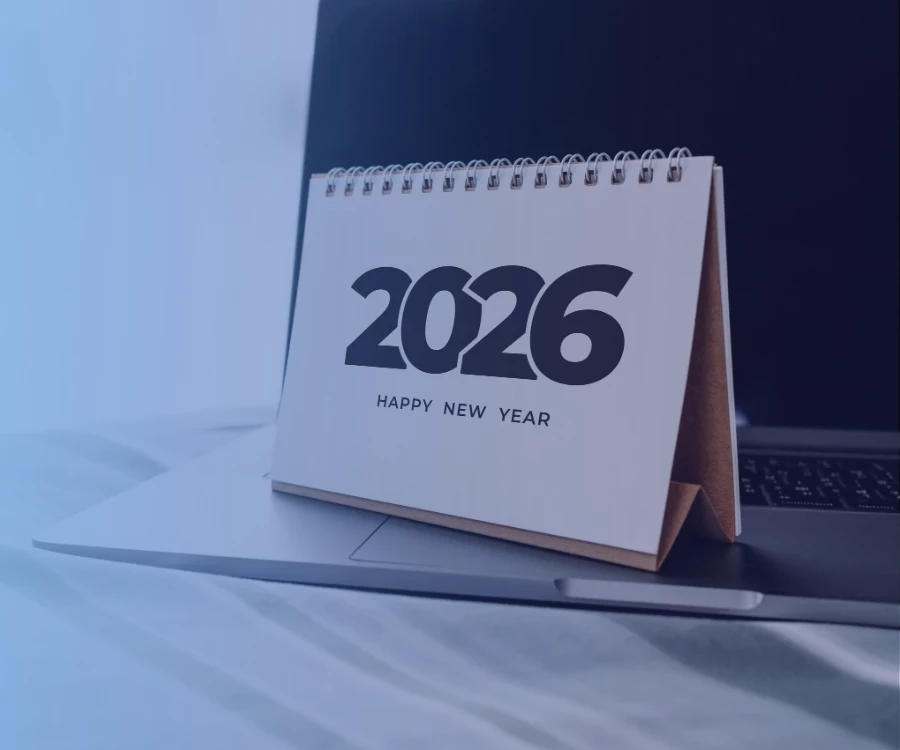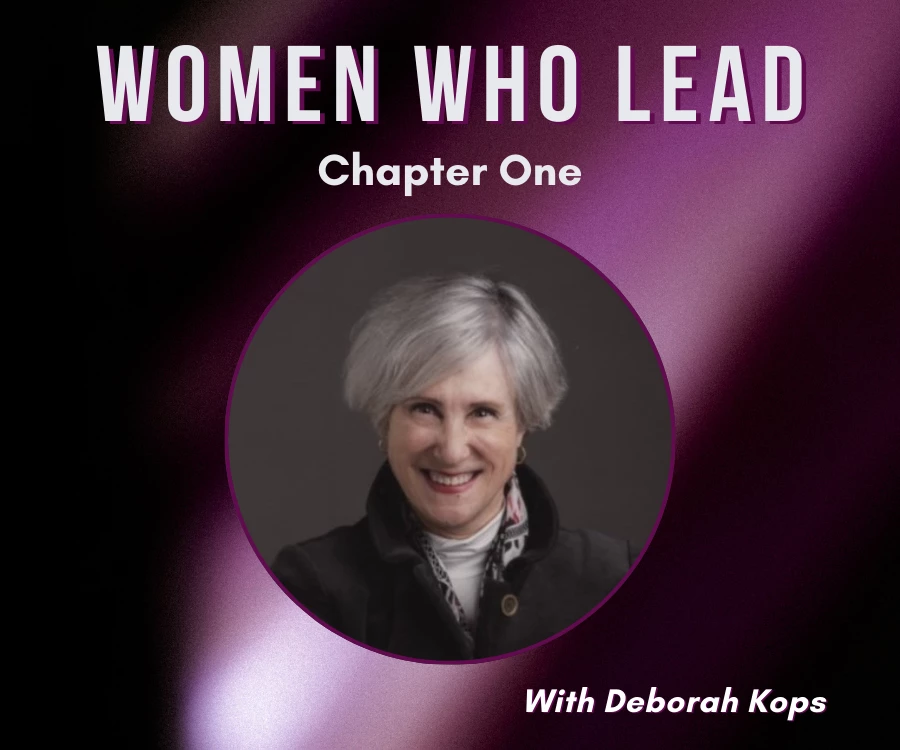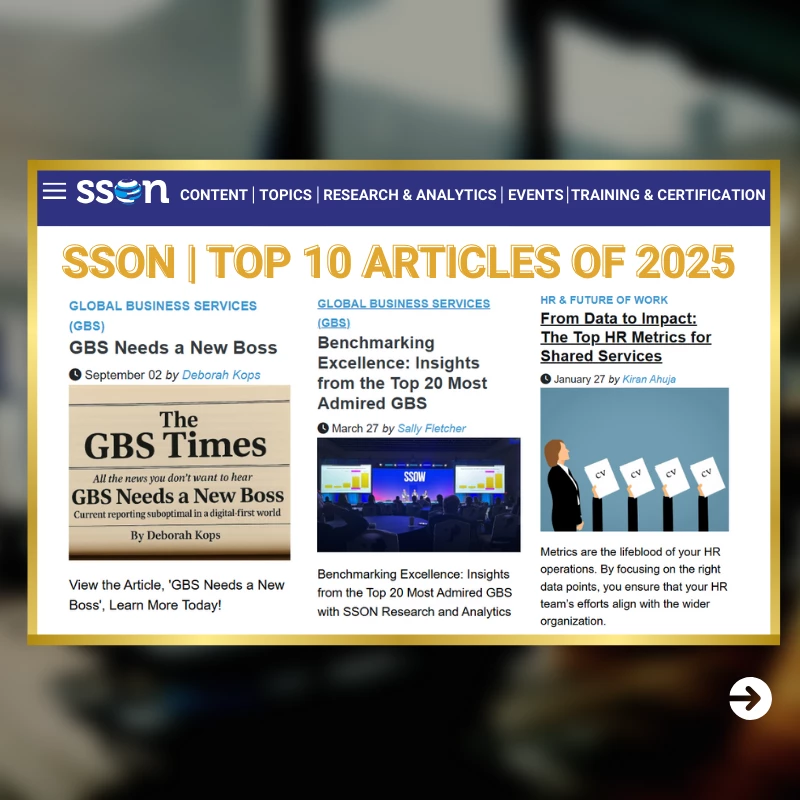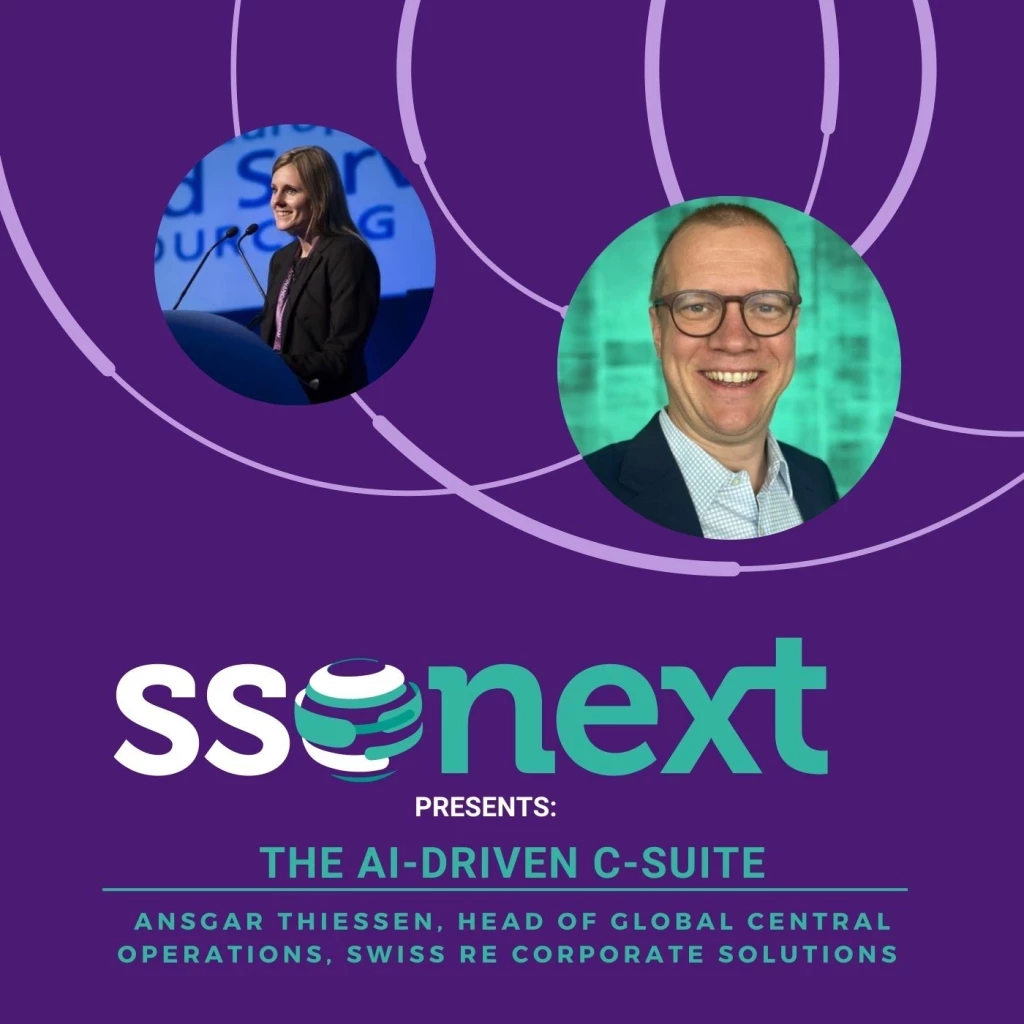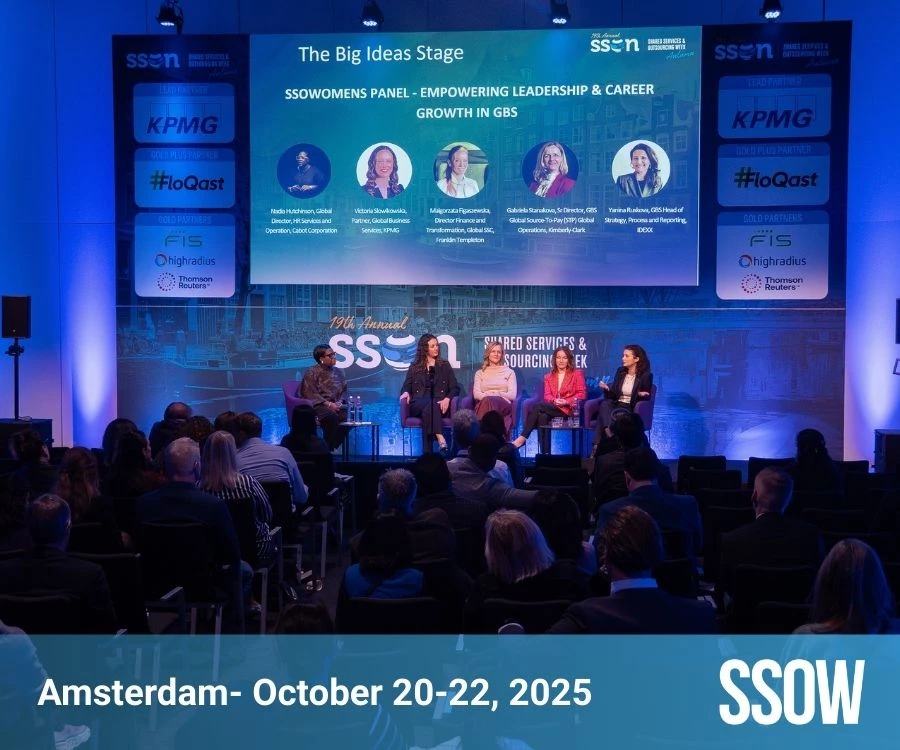SSON Podcast: Celestica's Manny Panesar – how GBS exerts much-needed discipline
Add bookmarkCelestica’s Vice President of Global Business Services, Manny Paneser
"I gotta talk to my clients in sales, business segments, or operations and ask what issues are you having with customers, how we can we serve customers better? Help me understand that? How can I help you do that? That’s my job."
Manny joins us from SSOW Canada where he shares that he truly believes in the discipline of Global Business Services. He’s trying to look at the cause and effect of processes. The traditional silos are great for creating subject matter experts within each function, but cause and effect of a many processes run across functions. So for connected processes a horizontal structure is more appropriate. Again, the definition of GBS. But what’s interesting in Manny’s case is that when GBS took over certain processes for the organization, he added humans yet saved cost. Which means that today’s world can still feature non-automated continuous improvement to achieve process excellence.
Listen now:
[Transscript below]
Seth Adler: Celestica's Manny Panesar joins us. First some supporters to thank, and thank you for listening. This episode is supported by SSON with over 100,000 members, the shared services and outsourcing network is the largest and most established community of shared services and outsourcing professionals in the world. SSON is a one stop shop for shared services professionals offering industry leading events, reports, surveys interviews, white papers, videos, editorial, info graphics and more. Engage at ssonetwork.com.
This episode is also supported by SSON analytics, digestible data driven insights for shared services and outsourcing. SSON analytics is SSON's global data analytics center. It provides shared services professionals with the global data insights you need, through interactive maps tools and charts. Get headline industry statistics sent straight to your inbox. It's that simple. Explore the first layer of industry data for free now, start a conversation to find out more. Sign up at sson-analytics.com
Celestica's vice president of global business services Manny Panesar joins us from SSOW Canada, where he shares that he truly believes in the discipline of global business services. He is trying to look at the cause and effect of processes, that traditional silos are great for creating subject matter experts within each function, but cause and effect of many processes run across functions. So, for connected processes horizontal structure is more appropriate. Again, the definition of GBS, but what's interesting in Manny's case, is that when GBS took over certain processes for the organization, he added humans yet saved cost, which means that today's world can still feature non-automated continuous improvement to achieve process excellence.
Welcome to SSON on B2B IQ. I'm your host Seth Adler. Download episodes on ssonetwork.com or through our app and iTunes within the iTunes podcast app, in google play or wherever you currently get your podcasts. Manny Panesar.
Manny Panesar: Panesar.
Seth Adler: Panesar, but you said it different. What did you say?
Manny Panesar: Panesar.
Seth Adler: Panesar.
Manny Panesar: You're right. I'm sorry.
Seth Adler: I like to make sure that I get it right, because I called my girlfriend Magdaléna for a very long time her name is Magdalana. I heard her talking and she said it to ... This is years ago, but to a customer service person she says Magdalana. I thought to myself, that's not the name I call her. So I had to change.
Manny Panesar: Good thing you did right?
Seth Adler: Absolutely. The only thing that's constant of course is change.
Manny Panesar: Absolutely.
Seth Adler: ... Especially in GBS.
Manny Panesar: Oh at GBS yeah for sure.
Seth Adler: So Celestica. Big old company, GBS somewhat new. Right?
Manny Panesar: GBS is new, less than three years.
Seth Adler: Less than three years. And you in GBS is how many years?
Manny Panesar: Two and a half.
Seth Adler: All right, so here we go. Let's just dive in on GBS at Celestica. There are a number of different cogs.
Manny Panesar: Process streams
Seth Adler: Process streams is probably a better way to talk about it.
Manny Panesar: Cogs as well yeah.
Seth Adler: And you're responsible for a specific one of them ?
Manny Panesar: I'm responsible for what we call the end to end process for opportunity to cash, also known as quote to cash, and within that is also ... It's probably more familiar terminology in shared services, order to cash.
Seth Adler: Let's just lay out the other process.
Manny Panesar: Sure, the other big process is actually the quote process, or proposals process to our customers.
Seth Adler: I mean outside of your area, because we're going to dive in on yours.
Manny Panesar: Outside of my area?
Seth Adler: Yeah.
Manny Panesar: Outside of my area the other big one is ...
Seth Adler: In GBS ...
Manny Panesar: In GBS is sourced to pay, or procure to pay. Engaged to run is our IT centric process there, acquired to retire is the other one, and record to reporting and insight, is the finance one.
Seth Adler: All right, so we've got this all down here, because you put up a chart that had how many different ... You had supply chain, you had finance, you had IT, you had sales, you had the whole thing. How many of those 10, whatever?
Manny Panesar: Different functions, seven around there.
Seth Adler: And then you had a nice big line that went across the whole thing and that was GBS. Right?
Manny Panesar: Yes.
Seth Adler: Diving in on yours, quote to cash, why do you specifically call it what you call it?
Manny Panesar: So Seth we're trying to look at cause and effect, and cause and effect in terms of a process, runs across functions. In the traditional silos, while good for expertise within that function, for particular process that is connected, a more horizontal structure is more appropriate.
Now, it doesn't come without its challenges, but in terms of impacting as I mentioned, what happens in the upstream from the process, the impact is has downstream having it under one function, within the same sort of operating model, is we believe more efficient, more effective and leads to better outcomes.
Seth Adler: Let's take that quote process, because that's what you had on the session. I had a couple questions around that, because you added humans and saved time, which I found to be fascinating. Take us through the entire process. What was happening when GBS took over, what you guys did and how we found those results, arrived at those results?
Manny Panesar: The first thing was that, pieces of process were happening in different functions, within the quote process. Part of the process was happening within the sales organization, part of the process was happening in the finance organization. Now, the finance organization, they would do the modeling in that, but they weren't seeing in terms of the impact some of that was having in terms of our delivery to the customer, in the proposals piece.
First of all, it was a couple of things, one is just bringing folks in, and seeing off the same song sheet. Everybody knows what the process is. What does it look like? Okay, this what it looks like. Who is responsible for what? What are all the responsibilities? Define them clearly, in one area.
Seth Adler: Now, when you bring in sales and finance specifically, these are two different types of brains completely, how would you ever get them on the same page?
Manny Panesar: Well it's coming back to what outcome are we trying to achieve? And it's trying to get the highest quality proposal, most competitive and the most efficient and effective manner to the customer. How do we do that/ All right, well let's figure it. And two of the key pieces was that, where the actual project management of the proposal, and then putting the proposal together at the financials aspect of it, the inputs to the proposal and getting the approvals for that. That process needed to be standardized, and brought under one ownership and one owner.
Seth Adler: Meaning, they had two owners, meaning they had zero owners.
Manny Panesar: Well, they had two owners. We got stuff done, but it just took us a little bit longer. We made tons of improvements. We've got more ideas to make further improvements, because the world doesn't stand still even when you're making improvements. It's a dynamic world out there, and it's getting more demanding, it's nonstop, and so you get to come up with new ideas now, new ways of thinking as to how do we approach this now, the customer is asking for this. This is what they want.
Seth Adler: Continuous improvement, one might call it. Right?
Manny Panesar: Continuous improvement, it's continuous. It doesn't stop, that's why it's continuous.
Seth Adler: You had said something about ... Let me show you this process, doesn't look great on this slide here, and then you turn to us and said, "Realize that this is not the way that it is right now, this is constantly changing, because a process changes you can't keep it the same."
Manny Panesar: Yeah.
Seth Adler: Unless you keep it the same. Right?
Manny Panesar: You can even try to keep it the same, but what happens off the paper is different than what you put on the paper, and so you always got to revisit the paper and say, "Is this really what's happening today?" Well, no it's not what ... Okay fine, let's change that. But more importantly, how do we want it to work?
Seth Adler: Let's talk about that evolution of, hey we came in, GBS came in, we had sales, we had finance, we simplified the process, we added ourselves, which actually helped on time, and we've got better proposals going out there - Fantastic. Give us another example of ... And it might still be that one, but we came in, we changed it everything was, great. We came back six months later, everything fell apart.
Manny Panesar: Within GBS?
Seth Adler: You might not want to put that way, but give us an example of where ...
Manny Panesar: Where it didn't work?
Seth Adler: Where you just had to evolve it, you had to keep going on it.
Manny Panesar: I mean we're keeping going on everything.
Seth Adler: On everything of course.
Manny Panesar: But one right now that our focus is on, is actually the order management process, because the way we receive orders from our customers, and purchase orders, we actually haven't done an inventory actually as to how is that happening right now. Because they're coming in, various ways, Emails, through portals, sometimes over the phone. Not that we haven't had our intent to look at that, we just haven't had time.
I see tons of opportunity there, in terms of standardizing our order intake process as well. To get back to your point what hasn't worked so well, is that we're still finding ... Go back to the quote process, what we call in internal to the company, is we've got a lot of churn, a lot of iterations, a lot of back and forth, so that actually to me is actually going up that activity.
Seth Adler: Double checking, I want to make sure ...
Manny Panesar: It's not double checking, but do we have the right solution for the customer?
Seth Adler: Got it. We're over thinking maybe.
Manny Panesar: Well we might not be overthinking it, but we're spending a lot of time and it.
Seth Adler: Got it.
Manny Panesar: A lot of spends on it. Now I'm trying to say, we're spending a lot of time on this. The first thing we're going to do is, okay, what are we spending time on? Is it worth spending our time on? How much time should we spend on it? That's the next thing that we're looking at, but I have to do your point. Good question. What hasn't worked, I've actually seen that churn go up, since we actually took over.
Seth Adler: Right.
Manny Panesar: Part of it as well is I think our clients feel more comfortable and say well, "Can you just have a look at this way as well, in addition to that way as well."
Seth Adler: They see the value.
Manny Panesar: They see the value, but the same time, I'm saying how can we make this more efficient, more effective.
Seth Adler: So GBS comes in, and at first it's arm's length away,
"No we don't need you we don't ... Oh wait, okay now yeah, define we love you and actually we would love you to do these three other things."
Manny Panesar: Yeah.
Seth Adler: So that's all well and good when GBS comes in and solves their issue, right? Saves time on their stuff, now it sounds like we've got to GBS, GBS. Right? How do you look at that? Where you just said we ourselves in GBS don't have enough time for X. How do you ... Shared service, shared services right?
Manny Panesar: Seth it comes down to, one understanding what is truly important and goes back to, it's company strategy, What we try and do for our customers, then the next is our business is not high margins at all. We've got to ruthlessly prioritize. You call it ruthless prioritization. Engineering is our background and engineers love precision, so we are trying to say, precision comes at a cost, so let's see what is good enough to get us to the next level. What is good enough to get us to the next decision making area? Let's not try to target perfection for everything.
Seth Adler: Yeah before we perfect this, let's actually move on to the next thing, once we get to X or Y.
Manny Panesar: That's good enough, exactly.
Seth Adler: A couple clicks down from that is automation, right?
Manny Panesar: Automation yeah. I started off in manufacturing, I started off in quality engineering and process engineering, and automation was, let's make ... Years ago, was work that is not safe, work that is mind numbingly boring, let's automate that. Now we're doing the same thing to business processes, that's it.
Seth Adler: All right before we get to business, because you're on the shop floor it sounds like ...
Manny Panesar: I was on the shop floor.
Seth Adler: All right, where you from originally?
Manny Panesar: Originally from Toronto. I was born in India, but grew up here.
Seth Adler: You're from Toronto, meaning that you are a Maple Leafs fan, through and through.
Manny Panesar: Absolutely.
Seth Adler: Right.
Manny Panesar: Yes.
Seth Adler: And you had a PUC thing just take a tangent. What's the PUC ?
Manny Panesar: PUC is process user community.
Seth Adler: Okay and what was that just ...
Manny Panesar: Process user community is where the folks at the GBS working level, get together with their clients on a regular basis to talk about performance, more importantly talk about issues, that the clients having or we are having with our end customers and focus on those.
Seth Adler: So you have to skate to where the PUC is going to be?
Manny Panesar: Absolutely. It's an excellent way to put it
Seth Adler: It's a Wayne Redski quote.
Manny Panesar: You have got to go where the PUC's going.
Seth Adler: That's it, and by that we mean PUC, right?
Manny Panesar: PUC absolutely.
Seth Adler: There you go.
Manny Panesar: Thanks for bringing that up ...
Seth Adler: Yeah sure, bring it home. Bring it back to them. Toronto is pulling through, I mean you've probably even been to an argonauts game.
Manny Panesar: Absolutely.
Seth Adler: Right?
Manny Panesar: Blue jays, Let's not talk about those guys yet.
Seth Adler: I'd say, it's not a good season this year?
Manny Panesar: No this year ...
Seth Adler: Joey Bats came back and the whole thing ...
Manny Panesar: They are being challenged. I'm sure they are going to come out stronger at the end but we'll see.
Seth Adler: You remember Joe Carter?
Manny Panesar: Yeah .
Seth Adler: Touch them all Joe. Right?
Manny Panesar: Yeah Joe Carter.
Seth Adler: You'll never hit a bigger home run, and it's true. You can't. You've won the world series?
Manny Panesar: Yeah.
Seth Adler: Truly being a world series, having at least ..
Manny Panesar: Two in a row.
Seth Adler: Two nations involved. All right, so when did you get to the shop floor? Where did you go to school?
Manny Panesar: Here in Toronto.
Seth Adler: What was your major and all that?
Manny Panesar: My major was a mechanical engineering, and then a few years later, I went to business school here in Toronto.
Seth Adler: Fine.
Manny Panesar: But I started off as quality engineer. We used to make a memory cards for IBM PC's. Then after that, a couple years after that Cisco was one of our first big customers, and I was in the shop floor making prototypes for the first Cisco switches and networking products. That's where I managed a team and ...
Seth Adler: You saw you saw literally those robots come into the shop.
Manny Panesar: Yeah.
Seth Adler: So let's talk about that, because I haven't discussed that yet. Because I'm I'm talking about RPA and AI ... Let's talk about the first time right? ... Well not the first time, but the first time in our lives yours and mine that this came in. That automation came into our process.
Manny Panesar: The automation part Seth, a couple of things were happening at the same time. It was becoming the dotcom boom as well, we needed the people, and the skills that we said. "Okay, if you're going to be doing this job, we're going to redeploy you, we're going to let you do something else." Whether it's another manufacturing job, a more complex one, or administrative jobs. Back then, is when we started our lean journey. Lean six sigma, we call a bit more lean in terms of six sigma, gets into more of the statistic aspect of it, but on the shop floor people understand lean.
They understand the concepts of Kaiser, they understand the concepts of continuous supreme. That's where we started that.
So now we need some lead administrators. We don't have a job for you over there, but we got one for you over here. I do not see it being much different now, under these processes.
Seth Adler: Let me ask you this, you were upscalling workers, that was the goal, was to upscale the workers.
Manny Panesar: We had to.
Seth Adler: Why is it that in zeitgeist of automation today, we feel like we're not going to upscale workers at all? What's that about?
Manny Panesar: I think Seth, it's just the maturity of the process automation within business process, and I think once we start seeing more and more maturity, that will pass.
Seth Adler: Meaning folks will be upscaled?
Manny Panesar: Folks will be upscalled. There will be additional kinds of jobs that... For example, we never talked about data scientists before.
Seth Adler: No.
Manny Panesar: People engineers. So guys you can call it whatever you want, engineers are going to be now data scientists.Job tiltle change. It's a different job though.
Seth Adler: And totally understood and you and I are on the same page though, what I don't understand is if you and I get that, we saw the machines come in and that now they do that, and Dave that used to do that, he does this now, and he's a six Sigma green belt and he's fantastic, and we love him and he used to put a screw in the thing. How come we went in to that and said," All right, you're not going to do in this, but you are going to be doing that." But we're going into coming into this automation and saying, "Well we're going to automate all these processes and then we're going to lop off hundreds of thousands of jobs." As opposed to up scale those jobs. Do you have a thought on that or?
Manny Panesar: No I think there's going to have to be a plan for that. It's not going to just time by itself and I think it's...
Seth Adler: Was it easier to do in the shop, at the shop floor level.
Manny Panesar: In some ways yeah, in some ways it was easier. Partly because at that time ... Once the economy is booming and jobs are out there.Economies are flat and everybody's under intense pressure and the cost pressures are there as well, but this is where organizations have to make a decision. Strategic decision, as to what it is they want to be five, 10, 15 years from now, not just next quarter.
Seth Adler: This is probably not a good conversation for us to have right now, but that gets into the whole wage growth thing and productivity and all of that, and what we're seeing is that inflation or wages aren't increasing at the same rate as they used to, and maybe it's because we're not upscaling workers. All of it kind of comes in to how are we running the businesses that we run, these are my words not yours, just to be sure. But I guess I'm just going to table that for a second.
Manny Panesar: Seth, that's a great question, and then there's globalization, on shoring, bringing some jobs back. At the end of the day the markets will determine what's going to happen.
Seth Adler: Of course.
Manny Panesar: I'll give you an example even in China now, which we thought was lowest, but it's not lowest cost anymore. And a lot of lets say the transactional manual work is moving out of there, because even they now say, " Hey wait a minute." It's got to be additional value their workers need to provide, and the skills they need, need to be higher for us to get further now.
Seth Adler: So there we are there over there.
Manny Panesar: Over there. It's happening, there are companies going from China, they're looking at Vietnam, Cambodia other places. You know what? It's getting expensive there.
Seth Adler: Having been through this on the shop floor, seeing the different mindset coming into this next level of automation, where do you see us in what? Six months or three years or five years? How do you see it?
Manny Panesar: One thing that we do say in our company Seth, is that we're not trying to replace the person with the robot, we're trying to take the robot out of the person.
Seth Adler: That's it.
Manny Panesar: We want to take the robot other person, free them to do other things. Now, individuals are much more capable than some of us even think they're. And the amount of creativity they have, if you spend time with them, you ask them, they will blow your mind away.
Seth Adler: That's it.
Manny Panesar: You've got to unleash that potential.
Seth Adler: Totally.
Manny Panesar: You have got to unlock it.
Seth Adler: The other side of this is that I see in people that are younger than me, there's a bit of robotization in them. In other words, if my phone is always out, if I'm always plugged in that's an automated person. I saw someone on a subway to having a conversation. This is a male, he's a kid to me but let's call him a man, young man having a conversation with a young woman, and he's and he literally ... He's playing a game, while he's having the conversation with the woman, there's there's no dumber people on earth than young men as you and I both know. But having been one myself I'm allowed to say that, but it was fascinating to me he's literally part robot, part human all at the same. And it's like if we're going to try to take the robot out of these workers, so that the robots can replace them. I hope we can do that.
Manny Panesar: You're bringing now a different phenomenon, where at family gatherings everybody's on their cell phone watching different things.
Seth Adler: Weird.
Manny Panesar: Here we are as a family. I think that's part of technology as well, and how pervasive that is in our lives now, and how much dependent we are and if you lost your cell phone today, what would you do?
Seth Adler: Well, I wouldn't know when my plane was ...
Manny Panesar: There you go.
Seth Adler: I wouldn't know anything.
Manny Panesar: You probably don't carry cash, everything is on your cell phone.
Seth Adler: It's 100% Well not quite there. I don't carry cash. I do carry cards, I could though.
Manny Panesar: You could.
Seth Adler: And then I would have no money. I would have no understanding of where anything is. I would have no idea of anyone's phone number. That would be so scary. That's a very scary thing Manny. I've got to take the robot out of me.
Manny Panesar: You have got to take it out of you.
Seth Adler: We are way off so the subject here ...
Manny Panesar: I'm sorry Seth.
Seth Adler: No this is making me think in new and different ways, and I feel like that's your job and in GBS, is you're having a conversation with me makes me think about everything differently.
Manny Panesar: We started the GBS, the first job was to standardize the processes, get the processes in place, put the service management framework in place, make sure we've got our delivery network. Now that's getting sort of set, my job now next is that think about, okay now, where do we take it from here? What additional services can we bring in? More importantly I got to talk to my clients, would be in sales or business segments or operators. What issues are you guys having, with the customers? How can we serve the customers better? Help me understand that. How can I help you do that? That's my job, in addition to that, what are the latest trends going on? Whether it's technology best practices, benchmarking, world class benchmarks and water management what are they? And are we hitting those or not? All right?
I think we are pretty good, but what are the world class companies go to go talk to see the world class benchmarks, and how can GBS now take it to the next level. Operational efficiencies I got it right, but now it's going to be more about, we got tons of data, okay, that's great. What's the data telling us? Fine this is what its telling us now what do we do with the data?
How do we drive the insights that we have to make our company's performance, our customers performance even better, so that's the next step that I'm thinking of. At the same time I'm thinking of do I have the team? What additional talent do we need to bring in? I've got to bring in a data scientists or GBS. Do we need a center of excellence for data analytics? So I'm going to talk to my boss about that.
Seth Adler: How big is the team now, if you don't mind?
Manny Panesar: The total GBS is about 1,400 people.
Seth Adler: In how many geographies? All of them.
Manny Panesar: In 10 locations across, Asia, Europe, North America.
Seth Adler: And you said Romania was that you?...
Manny Panesar: Romania.
Seth Adler: Romania can service North America...
Manny Panesar: It can. They're about six hours ahead from North American time, so most of the day they can service them for sure. They're doing a great job.
Seth Adler: And maybe Asia gets the West Coast on the back end..
Manny Panesar: Asia gets the West Coast on the back and all of Asia obviously.
Seth Adler: So you don't have to have anything closer than Romania or Asia?
Manny Panesar: No, but I think we do need presence in North America.
Seth Adler: You do.
Manny Panesar: We do need presence in North America South, because number one for let's say where the customer, the client really wants to close touch high contact, and then also just to make sure we're really close to our, understand, keep you know that relationship, to make sure it's a partnership relationship and all the headquarters all the main guys are in North America.
Seth Adler: I hear a lot from the Caribbean, Central America, do you have any designs on where might a good landing spot?
Manny Panesar: We do have a facility in Mexico, because they're part of our manufacturing plant in. So we have a group there, and then in headquarters here in Toronto. Beyond that, it's not much. There might be, we call it remote people at our sites but there's no plans right now, at this time.
Seth Adler: All right. How many centers of excellence do you have?
Manny Panesar: In terms of GBS?
Seth Adler: Yeah.
Manny Panesar: We've got four big ones.
Seth Adler: Where are those? Where are those dots?
Manny Panesar: Dots are in Malaysia, Anglasia, Suzhou China, Oradea and in Toronto.
Seth Adler: Oradea?
Manny Panesar: Oradea in Romania.
Seth Adler: Aforementioned.
Manny Panesar: Sorry.
Seth Adler: Fair enough. And when I said center of excellence you thought, I was asking about RPA didn't you? No, I thought you were asking about our company in terms of where is aerospace and defense center of excellence.
Manny Panesar: Oh, the actual product.
Seth Adler: Yeah the actual end customer as you call that ...
Manny Panesar: You did point out just then, essentially you get up in the morning to make sure that the customer is getting what the customer needs.
Seth Adler: Absolutely.
Manny Panesar: And that's the beauty of GBS.
Seth Adler: Yeah that's beauty of GBS and a lot of the time, we'll say, "Well I don't talk to the end customer." No, but you know our internal customer, the client he or she is our mechanism or vehicle to understand what's going on with the customer.
Manny Panesar: That's it. That's the final mile, if we can at least get there.
Seth Adler: Get them happy satisfy them, then they can satisfy the customer.
Manny Panesar: Right. If that person's having a good day, good chance the customer is having a good day.
Seth Adler: Exactly that's the model.
Seth Adler: I've got three final questions for you. I'll tell you what they are, I'll ask you them in order.
Manny Panesar: Okay.
Seth Adler: What has most surprised you at work, along the way? What's most surprised you in life? And the soundtrack of Manny's life, one track one song, that's got to be on there? First things first though, What has most surprised you at work, guy who's been through more than one automation?
Manny Panesar: What surprised me most at work, it's a very pleasant surprise and I'll talk more about the company I'm working. It's the only company I've ever worked for and what surprised me most was that, after the first job the rest of the jobs that I got, I was asked to do them. I didn't have to apply. That's what surprised me most was that, and I think it goes to the company.
It's like that, and how they treat the people and the type of people they are, but that's what surprised me most was, every single job after the first one, I didn't have to apply it, they had confidence in me to do it, or they took a chance on me in probably most cases, we think Manny can do this job, whether it's ... Prior to this I was doing investor relations.
I didn't apply for that job. I just got asked, "Manny, you are in finance doing corporate FPNA, the previous IR director had left, they said, "We think you can do this job." I go "I don't know much about it." Have a look.
Seth Adler: What's the connective tissue between those three jobs? This one being GBS and the other two you just mentioned.
Manny Panesar: It's again coming back to investor relations, I could talk to you a lot more about that, but it's really we're trying to make the organization ... First of all it's a long term organization and when customers think about a company they want to work with, its Celestica. We want to be the top selected company that they ...
Seth Adler: So investor relations GBS, it's the same question. It's the same conversation.
Manny Panesar: It's the same question.
Seth Adler: Interesting.
Manny Panesar: Exactly.
Seth Adler: Interesting.
Manny Panesar: When they think about working with a company, they think about Celestica first.
Seth Adler: Perfect and it's because of Manny by the way ... At least partly.
Manny Panesar: Partly, well you know ...
Seth Adler: At least a little drop of Manny right?
Manny Panesar: You know what, if it's all about operational performance and flawless they are all happy.
Seth Adler: There you go. What's most surprised you in life? Surprised me in life? That's a good question. I hadn't expected this kind of change in technology, in terms of the acceleration that has happened. Particularly over the last five, 10 years and especially social media, in terms of the openness. I was on Facebook, I got off it but in terms of the amount of dependency coming back to your previous point on the young man, that has surprised me so much and that you see a live person in front of his girlfriend, yet he's playing a video game, or no I don't know what happened, or what's happening with their relationship, but I see it in families too. It's that people get so absorbed with that one device, and I know they haven't lost touch or they're you know not as connected as much physically with the other person, but that's surprising was how much dependency there is on that smartphone.
Seth Adler: Yeah it's crazy, and your point being, here's a great bad example. The guy in the train, but then the good example of like Seth literally just in terms of how you're running your life, what happens if you lose your phone, we are actually dependent on them to a fault, even if we're behaving correctly socially type of thing.
Manny Panesar: No I mean it's convenient, fast obviously. We depend on it in terms of social media, it's not a bad thing, of course. Because somebody's grandmother five different time zones away, can stay in touch.
Seth Adler: Connect right now.
Manny Panesar: Exactly.
Seth Adler: That's it. That's a good one, that's a good answer. On the soundtrack of your life Manny, what track, one song that's got to be on there?
Manny Panesar: One track one song ... Well so many to choose from.
Seth Adler: If you have the Rolodex as they go through feel free to just mention them.
Manny Panesar: The first one that comes to mind, Neil Young's, keep on rocking in the free world.
Seth Adler: Hell yeah Manny, hell yeah.
Manny Panesar: That's one of the first ones to kick it off.
Seth Adler: That is perfect. That is if nothing else to keep on rocking.
Manny Panesar: Keep on rocking Seth.
Seth Adler: Manny, thank you so much.
Manny Panesar: Thank you Seth.
Seth Adler: And there you have Manny Panesar. I've got to talk to my clients in sales, business segments or operations and ask what issues are you having with customers? How can we better serve those customers? Help me understand that. How can I help you do that? That's my job. Very much appreciate Manny Panesar and his time, very much appreciate you and yours. Stay tuned.





